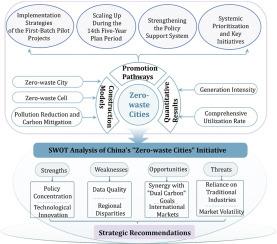Systemic governance and circular economy synergies: A multidimensional analysis of China's “Zero-waste Cities” initiative
引用次数: 0
Abstract
China's “Zero-waste Cities” initiative, launched in 2018, represents a transformative strategy to address escalating solid waste challenges through systemic governance and circular economy principles. This study systematically examines the initiative's framework, including pilot project deployment, policy evolution, and scalability during the 14th Five-Year Plan (2021–2025). The phased implementation prioritized sector-specific models—industrial symbiosis, agricultural circularity, and smart municipal waste networks—to transition from risk control to green transformation. A SWOT analysis identifies strengths in centralized governance and technological innovation while highlighting challenges such as regional disparities in infrastructure and low market acceptance of recycled materials. Strategic recommendations emphasize data-driven governance, fiscal incentives for circular businesses, and cross-sector collaboration to bridge implementation gaps. This research underscores the initiative's dual impact: mitigating solid waste pressures and offering globally replicable insights. The framework provides a blueprint for sustainable urbanization, contributing actionable strategies to the United Nations Sustainable Development Agenda through scalable models of circular economy integration.

系统治理与循环经济协同效应:中国“零废物城市”倡议的多维分析
中国于2018年启动的“零废物城市”倡议是一项变革性战略,旨在通过系统治理和循环经济原则应对不断升级的固体废物挑战。本研究系统地考察了“一带一路”倡议的框架,包括试点项目部署、政策演变和“十四五”规划(2021-2025)期间的可扩展性。分阶段实施优先考虑行业特定模式——工业共生、农业循环和智能城市垃圾网络——从风险控制过渡到绿色转型。SWOT分析确定了集中治理和技术创新的优势,同时强调了基础设施的区域差异和回收材料的低市场接受度等挑战。战略建议强调数据驱动型治理、对循环企业的财政激励以及跨部门合作以弥合实施差距。这项研究强调了该倡议的双重影响:减轻固体废物的压力,并提供全球可复制的见解。该框架为可持续城市化提供了蓝图,通过可扩展的循环经济一体化模式,为联合国可持续发展议程提供了可操作的战略。
本文章由计算机程序翻译,如有差异,请以英文原文为准。
求助全文
约1分钟内获得全文
求助全文

 求助内容:
求助内容: 应助结果提醒方式:
应助结果提醒方式:


